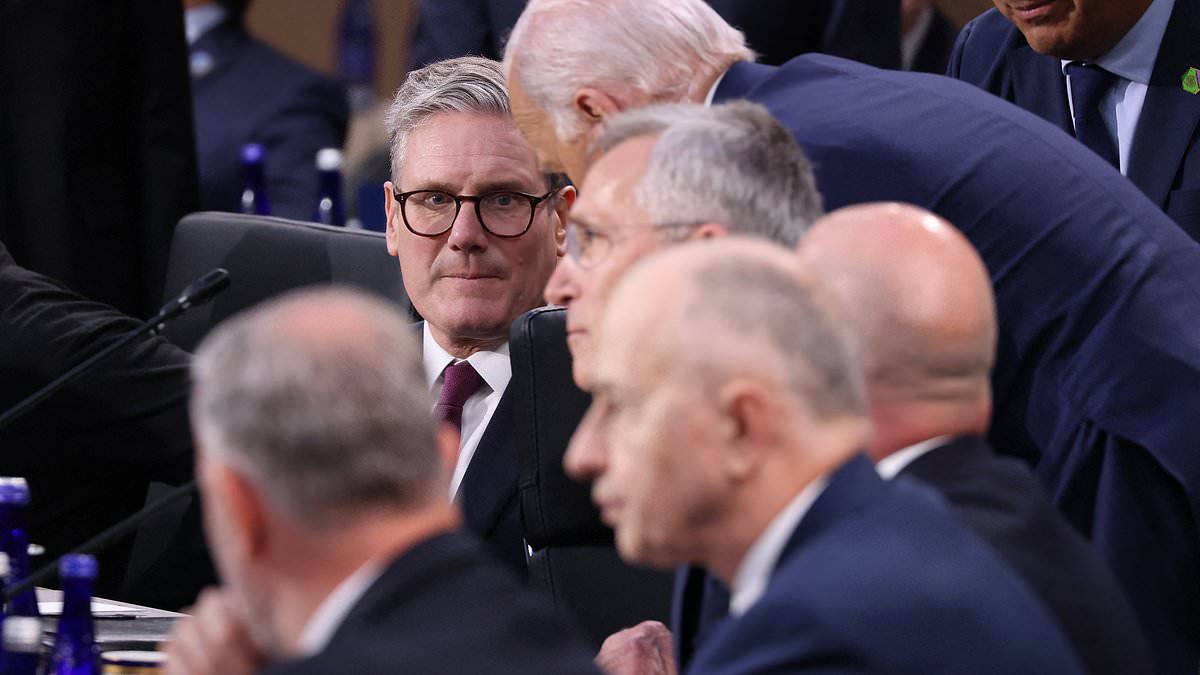Boosting defense spending is crucial to addressing the ongoing ‘generational threat’ from Russia and other hostile states, warned Sir Keir Starmer.
At the conclusion of the NATO summit in Washington, the Prime Minister urged member states to aim for at least 2.5% of their GDP on defense expenditures.
Facing criticism at home for not setting a clear timeline for reaching this goal domestically, Starmer emphasized the strength of NATO. ”
NATO is stronger than ever,” he noted, highlighting that 23 out of its 32 members currently spend 2% on defense. He added that, given the serious threats to security, a strategic defense review would be conducted to enhance the Armed Forces and safeguard national security.
“We will set a clear path to spending 2.5% of our GDP on defense,” he stated.
Starmer stressed the necessity of this increased spending to NATO allies, asserting, “This is now essential.”
He clarified that while NATO is a defensive alliance that does not seek conflict, the best way to avoid it is to be prepared.
The Prime Minister described the threat from Russia as a “generational threat” requiring a generational response and condemned the recent missile attack on a children’s hospital in Kyiv, calling the alternative to Ukraine’s victory “unthinkable.”
Starmer expressed strong support for Ukraine’s NATO membership, telling President Zelensky that NATO would be stronger with Ukraine as a member.
He remarked that NATO’s response to challenges from states like Russia, China, North Korea, and Iran would shape the world for decades.
Defense Secretary John Healey echoed Starmer’s sentiments, stating that the UK faced growing threats and confirming the government’s commitment to increasing defense spending.
Healey assured reporters at the summit that the UK might engage more with European defense structures but ruled out joining a European army.
He emphasized the importance of a strategic defense review to understand the threats, capabilities, and financial needs of the Armed Forces.
Reviewing Defense Strategies
Healey reassured that the defense review would be conducted thoroughly and swiftly.
He also mentioned the potential for the UK to participate in more areas of the EU’s permanent structured cooperation (Pesco) program, while clarifying that this would not lead to the UK joining a European defense force.
Government’s Position on Defense Spending
Security Minister Dan Jarvis defended the new government’s approach, stating it was necessary to assess the state of the UK’s defenses before finalizing a higher funding path.
Jarvis stressed the importance of understanding the nature of the threats faced and the resources required to ensure the Armed Forces are fit for purpose.
Commitment to Meeting Spending Targets
Despite questions about defense spending, Starmer remained confident that the spending target would eventually be met.
He criticized the previous 14 years of arbitrary targets and underfunding, which led to repeatedly missed goals.
Notable Moments from the Summit
The NATO summit also saw moments like Emmanuel Macron and Jill Biden holding hands, as the alliance debated future-proofing its support for Ukraine in case former US President Donald Trump returns to the White House.
Trump has previously criticized European nations for not contributing enough to their defense and has threatened to withdraw support for Ukraine and even pull America out of the alliance.
TDPel Media
This article was published on TDPel Media. Thanks for reading!Share on Facebook «||» Share on Twitter «||» Share on Reddit «||» Share on LinkedIn
